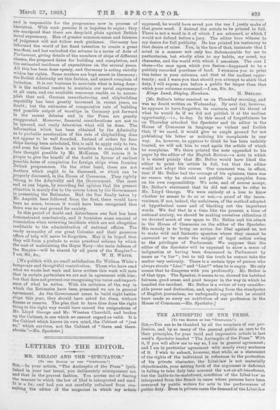LETTERS TO THE EDITOR.
MR. BELLO() AND THE "SPECTATOR."
[1'0 THE EDITOR Or THE "SPECTATOR:I
81R,—In your article, "The Antiseptic of the Press" (pub- lished in your last issue), you deliberately misrepresent me, and that in the gravest fashion. You accuse me of fearing the manner in which the law of libel is interpreted and used. It is a lie.; and had you not carefully refrained from con- salting the editor of the magazine in which my article appeared, he would have saved you the use I justly make of that grave word. I desired the article to be printed in full. There is not a word in it of which I am ashamed, or which I would not defend before a jury. The editor bore witness to my desire for full publicity. He has printed his testimony to that desire of mine. You, in the face of that, insinuate that I acted in a manner not only too dishonourable for me to particularise, but wholly alien to my habits, my creed, my character, and the world with which I associate. The case I ohose—the case upon which you fasten—happened to be a publicly recorded purchase of land. I summon you to print this letter in your columns, and that at the earliest oppor- tunity; and 1 warn you that should you attempt to shirk that duty, I will expose you before a public far larger than that which your columns command.—I am, Sir, So., Kings Land, Shipley, Horsham. H. BEDLan.
[Mr. Halloo's letter reached us on Thursday morning, and was no doubt written on Wednesday. By next day, however, he appears to have forgotten its contents, and his threat of what he would do if we did not publish it at the earliest opportunity,—i.e., to-day. In this mood of forgetfulness he on Thursday attacked the Spectator and its editor in the House of Commons in language so violent and foolish that, if we oared, it would give us ample ground for not publishing his letter or noticing his complaints in any way, As, however, he appears to think he has been unfairly treated, we will ask him to read again the article of which he complains. We there printed the note appended to his paper by the editor of the English Review,—a note in which it is stated plainly that Mr. Bello° would have liked the editor to print his article in full, but that the editor would not adopt this course. Our comment was, in effect, that if Mr. Belloc had the courage of his opinions, there was no reason why he should not publish in pamphlet form on his own responsibility. We note, and of course accept, Mr. Belloo's statement that he did not mean to refer to Mr. Lloyd George. We were entirely at a lose to know whether he meant to do so or not,—a proof of the incon- venience, if not, indeed, the unfairness, of the method adopted of hypothetical cases and of blacking out the important words. We feel that in a time like the present, a time' of national anxiety, we should be making ourselves ridiculous if we devoted much of our space to Mr. Belloc and his attack in the House of Commons on the editor of the Spectator. His remedy is to bring an action for libel against us, not to make wild and fantastic speeches where they cannot be answered or be made the subject of legal action owing to the privileges of Parliament. We suppose that the editor of the Spectator will be expected to show a sense of indignation at having been denounced in Parliament by name as "a liar "; but to tell the truth he cannot take the matter very seriously. There is a certain type of person who always shouts "Lies!" and "Liar!" when he is angry. He only means that he disagrees with you profoundly. Mr. Belloc is of that type. The Speaker, it seems to us, showed his habitual fairness, good sense, and good temper in the way in which he handled the incident. Mr. Halloo is a writer of very consider- able power and distinction, and, speaking from the standpoint of English journalism, we unfeignedly regret that be should have made so sorry an exhibition of our profession in the House of Commons.—ED. Spectator.]










































 Previous page
Previous page